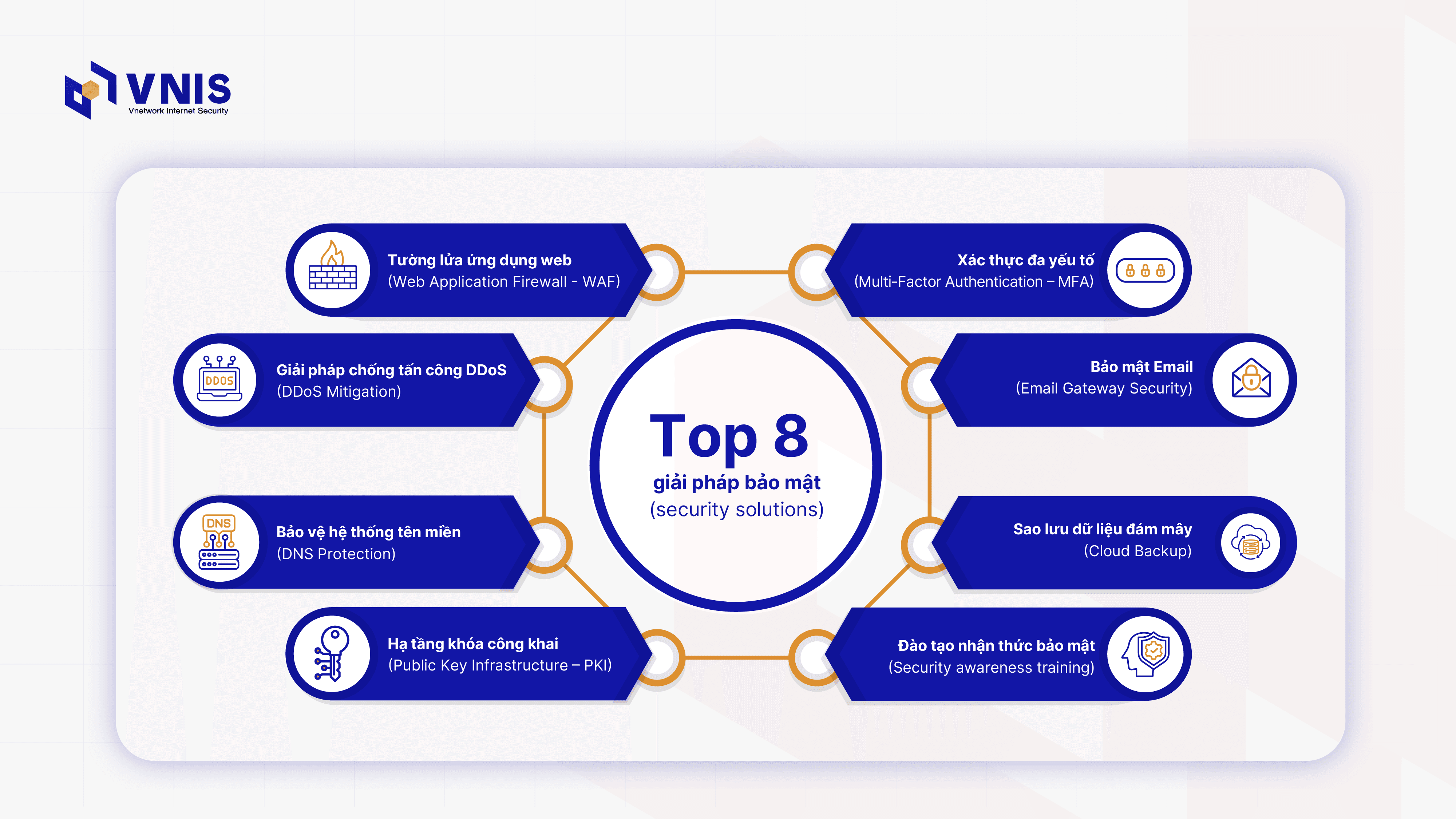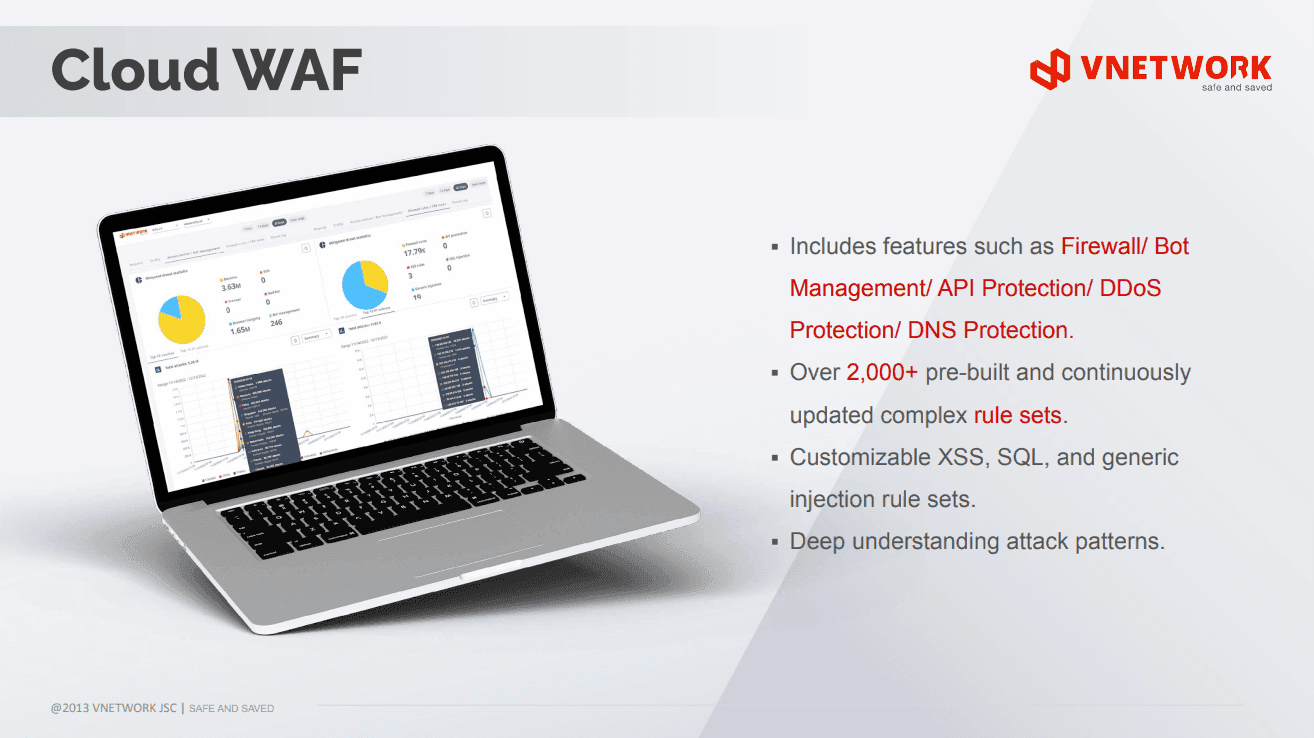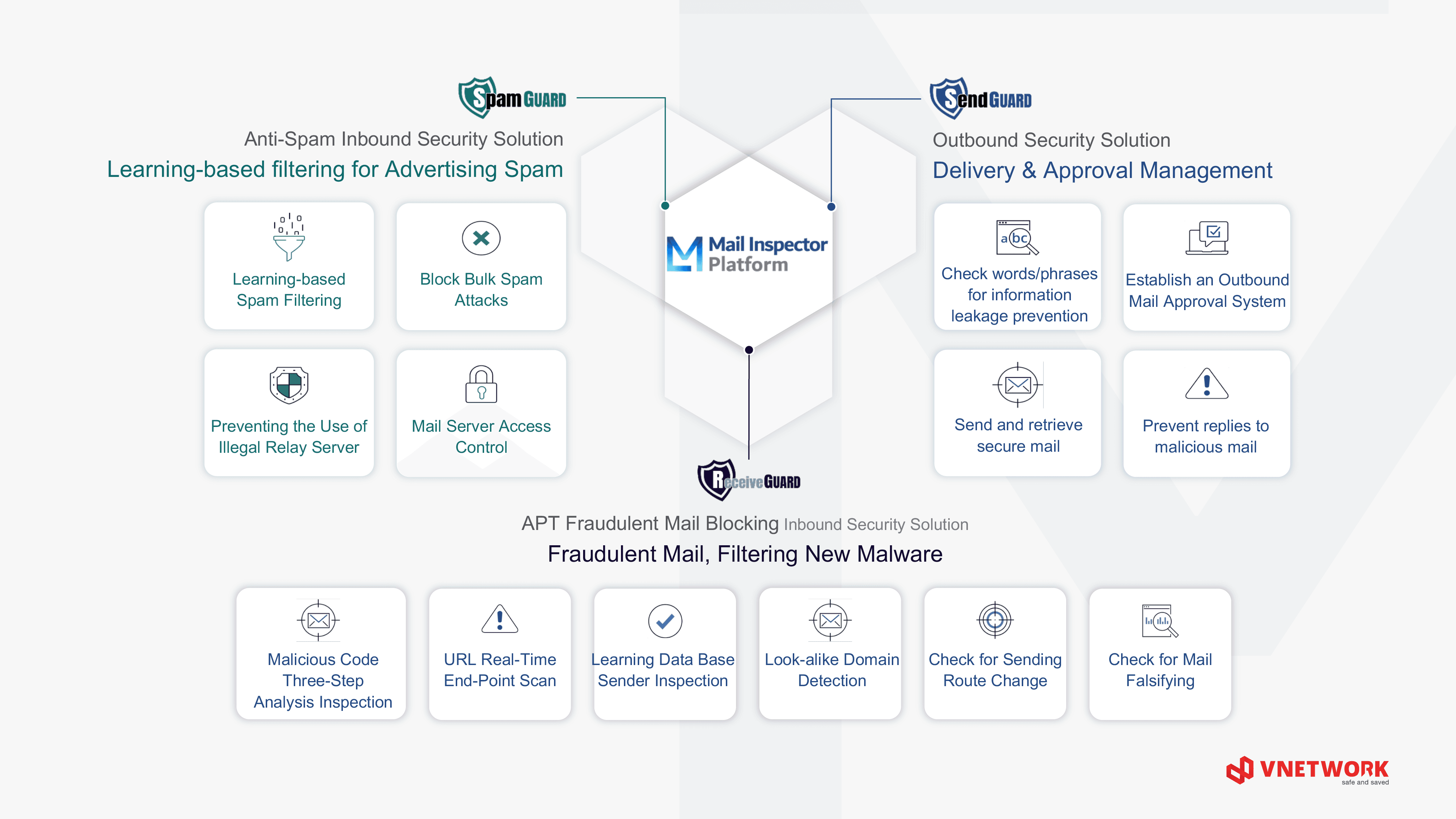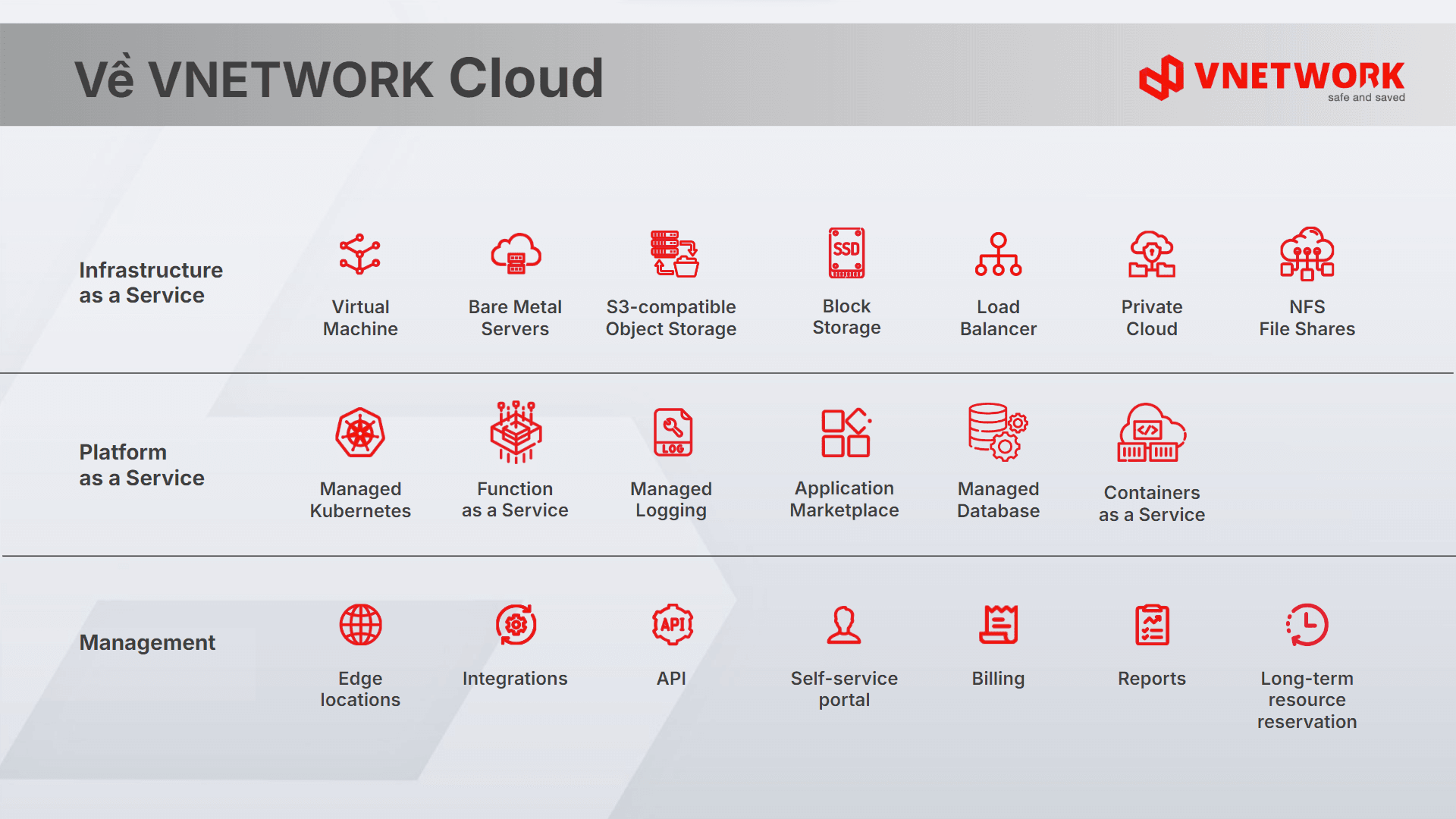Top network security solutions to implement for maximum business protection
Fri Oct 11 2024
In an era of rapid digitalization, information security has become vital for every business. According to Cisco's report, 60% of small businesses shut down within six months after a cyberattack, highlighting the severe consequences of insufficient security. This emphasizes the importance of implementing comprehensive and robust security solutions to safeguard critical systems and data. In this article, VNETWORK introduces essential security solutions that help businesses defend against increasingly sophisticated cyber threats.
Top 8 security solutions businesses need to implement
To ensure comprehensive protection of systems and data, businesses should consider the following security solutions to optimize network security capabilities.
 Top 8 security solutions
Top 8 security solutions
1. Web Application Firewall (WAF)
A Web Application Firewall is an essential website security solution that businesses cannot overlook. According to DBIR, 43% of cyberattacks target web applications, particularly vulnerabilities like SQL injection and Cross-site scripting (XSS). WAF serves as a frontline defense, protecting web applications and websites from these common threats and OWASP (Open Web Application Security Project) security vulnerabilities. WAF operates by monitoring and analyzing traffic to the system, blocking suspicious requests before they can harm the application or website. Implementing WAF is a critical first step in securing a business's security infrastructure. Learn more:
- 7 exceptional benefits of using Cloud WAF
- How to prevent today’s most dangerous security vulnerabilities
2. DDoS Mitigation
Distributed Denial of Service (DDoS) attacks remain one of the most serious threats to businesses. According to DDoS Threat Intelligence 2024, application-layer attacks increased by 43% compared to 2023. DDoS attacks aim to overload servers or websites by generating massive fake traffic, leading to system downtime or severe delays. Modern DDoS mitigation solutions include early detection technologies like Security Operation Center (SOC), Rate Limiting, and Content Delivery Network (CDN) to efficiently distribute traffic, reducing server load.
Solutions like VNIS provide robust DDoS mitigation services that detect and block malicious traffic in real-time, ensuring that only legitimate traffic reaches your system. Deploying DDoS mitigation solutions not only helps protect businesses from disruptions but also ensures continuity and stability for online services.
3. DNS Protection
According to Verisign's Domain Name Industry Brief 2024, DNS attacks have increased by approximately 60% year-on-year, with many attacks targeting vulnerabilities in the domain name resolution system to redirect users to malicious sites or disrupt system operations.
DNS attacks can cause network congestion, data theft, and organizational disruptions. Effective protection against these attacks involves using reliable DNS services, which not only ensure quick and stable domain resolution but also provide advanced security features like blacklisting malicious IPs and protecting against DNS Flood (DDoS) attacks. This ensures legitimate DNS queries are processed even during high-traffic attacks.
For further reading: What is DDoS DNS Flood and how to secure DNS effectively
Additionally, using DNS solutions that incorporate attack detection and prevention and implementing DNSSEC (Domain Name System Security Extensions) can protect DNS data from spoofing attacks, ensuring network integrity and security for businesses. Adopting these technologies not only protects businesses from cybersecurity threats but also maintains business continuity in the digital age.
4. Public Key Infrastructure (PKI)
Public Key Infrastructure (PKI) is crucial for a business's online security, especially in protecting sensitive transactions and data over the internet. One of the most common PKI applications is SSL (Secure Sockets Layer), now replaced by TLS (Transport Layer Security) in advanced security protocols. SSL/TLS ensures that data exchanged between browsers and web servers is encrypted, preventing unauthorized access or interference.
Google reports that over 80% of websites using SSL experience higher security levels and are less prone to attacks than those without certificates. Furthermore, Google has implemented a policy of lowering search rankings for non-HTTPS websites, further encouraging businesses to adopt it to enhance visibility and optimize SEO performance.
5. Multi-Factor Authentication (MFA)
Multi-Factor Authentication (MFA) requires users to provide two or more independent authentication factors before accessing a system, application, or account. These factors can include something the user knows (password), something they have (OTP sent via phone or security token), or biometric data (fingerprint, face recognition).
Research from Microsoft shows that enabling MFA can prevent up to 99.9% of account attacks, especially methods like credential theft and password-based attacks. MFA adds an essential layer of security, reducing the risk of hackers accessing systems even if they have obtained one authentication factor, such as a password.
MFA solutions are widely implemented on major platforms like Google, Microsoft, and Facebook, as well as in enterprise systems. They not only enhance security but also align with the growing need to protect data in remote work and cloud computing environments.
6. Email Gateway Security
According to Statista, email remains the most common cyberattack vector, with over 94% of malware attacks beginning via email. Hence, email security is indispensable for preventing phishing and malware threats. Email security solutions include spam filtering, email encryption, sender authentication (DMARC, DKIM, SPF), and data leakage prevention via email. To enhance security, businesses should also train employees to recognize phishing emails and secure personal information. Learn more:
- ITU's Global Email Security Framework: An essential cybersecurity solution for businesses
- How to detect and prevent ransomware emails in a timely manner
7. Cloud Backup
Cloud backup has become one of the most essential and effective security solutions, not only ensuring operational continuity but also protecting data from increasingly prevalent threats such as cyberattacks, system failures, or data loss.
According to IDC, approximately 60% of businesses globally have adopted cloud backup solutions to enhance data recovery capabilities and minimize damage in the event of incidents. Unlike traditional backup methods, cloud backup stores data across multiple geographically dispersed data centers, which enhances redundancy and ensures that an incident in one area does not result in complete data loss.
Additionally, cloud backup service providers use advanced encryption methods during both transmission and storage, protecting data from intrusion and theft. By utilizing this encryption, businesses can be assured that their data remains absolutely secure, even when malicious actors attempt unauthorized access.
8. Security Awareness Training
According to IBM, 95% of successful cyberattacks stem from human error. Therefore, enhancing security awareness among employees is indispensable for protecting a business's information. Training includes identifying cyberattack signs, safeguarding personal data, and responding to security incidents.
Advanced solutions from VNETWORK
Amidst rising cybersecurity challenges, VNETWORK offers three leading solutions to provide comprehensive protection for businesses. VNIS defends Web/App/API against DDoS attacks and security vulnerabilities, ensuring system safety and stability. Mail Inspector Platform protects email with three intelligent filtering layers, blocking threats from email attacks, viruses, and malware. Lastly, VNETWORK Cloud delivers a high-performance, secure cloud infrastructure that enables businesses to easily manage and expand their infrastructure while ensuring data security.
VNIS - Comprehensive Cloud-WAF security solution for businesses
 VNIS provides comprehensive security for business systems
VNIS provides comprehensive security for business systems
VNIS offers an all-encompassing security solution for Web/App/API against DDoS attacks across layers 3, 4, and 7, with infrastructure availability up to 2,600 Tbps combined with Multi-CDN systems. This ensures the stability of web applications even during traffic surges or attacks. Notably, VNIS detects and blocks all critical vulnerabilities listed by OWASP (Top 10 OWASP), including SQL injection, XSS injection, Broken access control, Cryptographic failures, and more, keeping the business website protected. With over 2,000 security rules updated monthly, VNIS acts as a solid shield, blocking any exploitation attempts and ensuring website security for businesses.
Additionally, with the DNS Protection feature within VNIS, businesses can rest assured of quick and secure domain name resolution. VNIS incorporates advanced security features, including blacklisting malicious IPs and protection against DNS Flood attacks, ensuring that legitimate DNS queries are processed stably even under large-scale attack loads.
Moreover, deploying VNIS provides businesses with built-in SSL/TLS security protocols, optimizing security efficiency and enhancing SEO performance.
Mail Inspector Platform - Effective email security solution
 Mail Inspector Platform with three advanced filters
Mail Inspector Platform with three advanced filters
As the complexity and scale of email malware attacks continue to grow, VNETWORK offers the comprehensive email security solution, Mail Inspector Platform – an email firewall system that secures both inbound and outbound email with three filtering layers: SpamGUARD, ReceiveGUARD, and SendGUARD.
Leveraging advanced and intelligent email security technologies, the Mail Inspector Platform addresses all types of targeted email attacks, detects and blocks various types of viruses and emerging email threats. Key features include Machine Learning, AI Technology, Virtual area, Image conversion, Email traffic inspection and analysis, Comprehensive system reporting, and Flexible customization based on user needs.
VNETWORK Cloud – Optimal solution for business infrastructure
 VNETWORK Cloud with diverse features
VNETWORK Cloud with diverse features
VNETWORK Cloud provides a robust cloud infrastructure solution designed to ensure performance, security, and flexible scalability for businesses. This platform enables rapid setup and configuration in just a few minutes, with support for customizable operating systems, meeting various deployment needs.
The system integrates automated management solutions through an intuitive Portal, API, and Terraform, optimizing the management and deployment process. Utilizing cutting-edge technology and next-generation hardware, including high-speed NVMe+ SSD drives, the platform delivers impressive read and write speeds (Read 53,000+ IOPS, Write 17,900+ IOPS), with a 99.99% uptime guarantee, offering optimal stability and performance for businesses.
VNETWORK Cloud also allows flexible scaling with network speeds up to 10Gbps and unlimited bandwidth, making it easy for businesses to scale resources according to their needs without concerns about service disruption.
In terms of data protection, VNETWORK Cloud stands out with automatic backup three times daily, with three stored backups, including one full backup retained for the most recent seven days, ensuring continuous data safety. Furthermore, the system integrates comprehensive security solutions from VNETWORK, enhancing performance and ensuring defense capabilities against cyber threats, fully complying with international standards such as ISO 27001 and 20000-1.
Security should not be an afterthought. Protect your business proactively today to ensure safety and sustainable growth. Contact VNETWORK at hotline (028) 7306 8789 or email contact@vnetwork.vn for detailed consultation on the most comprehensive and optimal security solutions for your business.
Table Of Contents